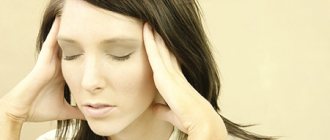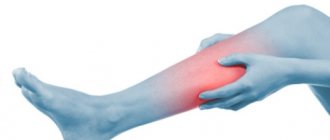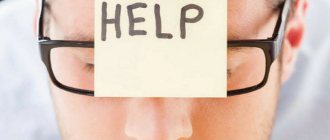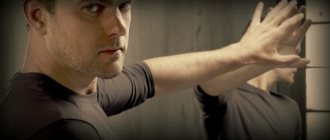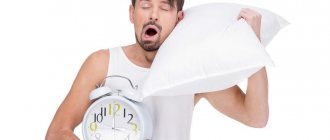Compulsive overeating is an eating disorder of the overeating type, in some sources it is also called psychogenic overeating. It is expressed in attacks of uncontrollable gluttony, alternating with a period of repentance and “self-flagellation.”
There is very little data on the unity of causes in different people. Its description was first made only in 1993. It can act as a symptom of various neurological and mental diseases, personality disorders: anxiety, depression, alcohol and drug addiction, and a number of others.
At the same time, the desire to overeat will be like an obsession. A person strives to eat more, without any conscious goals - to satisfy hunger, eat for company, or try a new dish, like ordinary people. There are currently no unambiguous symptoms recognized by all specialists to define the disorder.
Panic attacks as a component of vegetative-vascular dystonia
Panic attacks are a companion for people with VSD. First, let's understand the terms. A panic attack is an attack of unreasonable fear for one’s health, a feeling of approaching death. The attacks can be so strong that the person will rush around the room, unable to find a place for himself, and he may be trembling. High blood pressure, pulse is such that it’s close to fainting. Lack of air, burning and pain behind the sternum. Signs may be very similar to myocardial infarction. There are pains in the heart area, which can be distinguished from angina pectoris by the fact that they last longer (several days, weeks). A drug called “Nitroglycerin” does not relieve such pain, while taking a drug such as “Validol” can alleviate the condition.
VSD is not a disease, but a set of symptoms indicating a disturbance in the activity of the central and peripheral parts of the autonomic system.
Vegetovascular dystonia is divided into several types:
- Hypertensive is caused by increased blood pressure, there may be discomfort in the heart area, tachycardia. People with this type are prone to panic attacks.
- Hypotonic is characterized by low blood pressure, dizziness, weakness, and headaches.
- The mixed type includes symptoms of the other two types and is the most common.
The presence of vegetative-vascular disorders is not life-threatening, but they can aggravate the course of existing diseases, and, together with other unfavorable factors, contribute to the development of diseases such as bronchial asthma, arterial hypertension, ulcers (in the presence of irritable bowel syndrome - IBS), coronary heart disease.
Clinical picture
According to scientists, panic attacks are a consequence of malfunctions of the central nervous system. This circumstance is the reason that the disease in question is included in the category of psychosomatic neurotic disorders. According to statistics, the prevalence of the syndrome in question is less than ten percent. Among the clinical manifestations of panic attacks, the following symptoms should be highlighted:
- Dry mucous membranes, increased muscle tone.
- Attacks of nausea, tachycardia, changes in body temperature.
- Sudden changes in blood pressure and increased sweating.
- Cramps in the stomach.
- Disturbed perception of reality, the appearance of anxious thoughts and obsessions.
It is important to pay attention to the fact that fear manifests itself at the subconscious level.

Some events that accompanied panic attacks may fall out of memory. Also, according to experts, the very thought of an object of fear (phobia) can trigger the development of a panic attack.
Physical manifestations of psychological problems
In Russia, people are not accustomed to turning to doctors for every reason; few of us have a family doctor or a personal psychologist. For some, their financial situation does not allow it; for others, the frantic pace of life does not allow it. Many people think that going to a psychologist is a waste of time. The question constantly haunts me: if I have panic attacks, how to deal with it? You can’t always cope on your own, you should remember this.
The habit of solving all problems alone often leads to aggravation of the situation and can lead to a sad outcome. There may be daily panic attacks. How to fight them on your own when you have no strength? You need to ask for help from your family, who will try to understand and support. When your loved ones are powerless, there is no need to waste time; you should urgently contact a specialist. There's nothing wrong with this. A visit to a psychotherapist in no way means that a person is mentally ill, there are simply difficulties that each of us periodically experiences. For the most part, we are talking about depression, which can accompany many diseases and conditions such as VSD with panic attacks.
Symptoms of the disease
Psychogenic overeating is characterized by the following symptoms:
- Periodically recurring bouts of overeating.
- Lack of control over food intake. A person strives to eat as much as possible and gives himself large portions.
- Eating food to the point of feeling discomfort. The desire to eat does not stop even after feeling full. Eating food continues until pain occurs in the body.
- Eating a large amount of food alone, even without a physical need for food at the moment, especially when experiencing some troubles in life. Most often, people realize that they are eating too much.
- Feeling of shame from gluttony. After an attack of overeating, a period of repentance for one’s behavior begins. With a new attack of gluttony, everything repeats again.
- Absence of compensatory behavior after bouts of overeating - people do not try to carry out cleansing procedures such as inducing vomiting, taking a large dose of laxatives so that the food is not digested and does not lead to weight gain. This criterion is controversial.
All of the above signs should be observed in a person for a long period - at least three months, and bouts of overeating should occur at least twice a week. According to many experts, this will be one of the signs of an eating disorder such as overeating.
It is difficult to establish an accurate diagnosis for patients in whom such attacks occur less frequently, but all other signs are present. In addition, compulsive overeating is similar to another eating disorder, bulimia nervosa, which also exhibits all of the above symptoms. At the moment, no clear differences recognized by all experts have been identified.
But patients with non-purging bulimia nervosa have a sharply negative pathological attitude towards themselves, their body and weight. On the other hand, during the development of the disorder, one person’s attitude towards himself and his body may change, that is, how pathological (abnormal) this opinion is at the moment is often difficult to judge. Therefore, each case will be considered by a specialist individually.
Is it possible to cope with panic attacks on your own? Experts' opinion on this matter
Panic attacks are accompanied by phobias: fear of suffocation, choking, death, or contracting an incurable disease. Moreover, a person will worry about his parents, children, and people dear to him.
The trigger for the onset of PA can be anything: psychological fatigue, stress, factors such as an accident, being in a cramped, stuffy bus, illness or death of a loved one. At one of these moments you may experience your first PA. Then they begin to repeat every day, usually in the evening. When panic grips a person (no matter what he does) every day, for example, at exactly 18.00, on a subconscious level he begins to wait, worry, worry, which further aggravates the situation.
During PA, the body experiences severe stress, after which a person may feel completely exhausted.
On the other hand, knowing the exact time of the attack, you can prepare yourself mentally and take all necessary measures. The time has come: panic attacks. How to fight? Kurpatov, a famous psychotherapist, suggests looking at all this from the other side. His books are written in simple, understandable language. People with PA should read “The Remedy for VSD.”
Dr. Kurpatov says that the main thing for such people is to realize that they will not die from PA. He gives a peculiar, but very useful piece of advice, which goes something like this: “When you think you are about to die, lie down... and die.” Naturally, it is not possible to die, and understanding this has a good psychotherapeutic effect.
Who is at risk
Women are more affected by this disorder than men.
And women seek medical help for eating disorders much more often. The following categories of people are believed to be at risk:
Teenagers
The disorder occurs during the period of active maturation of the individual, his socialization is no longer like a child. Seeing their figure in the mirror, girls (less often boys) come to the conclusion that they clearly do not fit into the “canons of beauty” and begin to cheer themselves up, most often with sweets. Subsequently, food addiction occurs.
Bouts of overeating are repeated many times. Dissatisfaction with oneself grows, and at the same time weight increases, dissatisfaction increases even more, a person finds himself in a vicious circle, from which he himself is often unable to break out. According to statistics, eating disorders most often occur during adolescence.
People who are overweight
These are also obese individuals with certain personality characteristics. Presumably, those at risk are people with obesity and personality traits such as unstable self-esteem, increased nervous excitability, neatness, indecisiveness, often negative perception of themselves and their body, impulsiveness (impetuousness) of behavior, and frequent alcohol or drug addiction.
The mechanism of occurrence is the same as described above: people try to overcome the consequences of stress with the help of food. Next - the emergence of food addiction, and as a result - psychogenic overeating.
But adolescence and excess weight will not be the only correct criteria for determining the risk of developing the disorder. It occurs in people of different ages with different body weights.
There are suggestions that often eating disorders of the overeating type arise due to a dysfunctional family situation, with the main role being given to the behavior of the mother, how attentive she is to the child, how she treats him.
People with concomitant mental illnesses
According to research at the end of the 20th century, it was revealed that often people suffering from compulsive overeating were diagnosed with various mental disorders before its onset. This was observed in 87% of patients in the study group.
Therefore, mental disorders (especially anxiety) are a risk factor for various types of eating disorders. There are research results that compared two groups of obese people: in the first, people suffered from a binge-eating disorder, and in the second, they did not.
Anxious mental disorder is a personality disorder that is expressed in a constant feeling of internal tension when a person does not feel safe. He reacts extremely painfully to criticism and remarks, wants to please and be recognized in society, but at the same time loses feelings of affection for loved ones. Everyday situations begin to be considered full of dangers and risks.
It turned out that obese people with a pathological eating disorder have signs of depression, and some patients have symptoms of other mental illnesses. In the second group, there were practically no signs of mental disorders.
Panic attacks: how to deal with them. Reviews from VSDshnikov
Patients suffering from panic attacks are usually prescribed sedatives, tranquilizers, and adrenal blockers. They also prescribe massage and exercise therapy. It is necessary to figure out whether such methods will really defeat the PA.
Judging by patient reviews, exercise therapy and massage have a positive effect, but sedatives do not always. They often make you want to sleep, but they do nothing to stop the attacks.
Massage helps you relax and improves blood circulation. Why is sport so useful? The fact is that PA begins due to the uncontrolled release of adrenaline into the blood. Normally, this process should occur when a person is in an extreme situation, and not sitting quietly in a chair. If you know the time of onset of a panic attack, you can engage in physical activity. It won't hurt to jog in the fresh air or exercise at home. This is a very effective method that will help stop an attack, because the adrenaline will have somewhere to go.
— 6 simple ways to combat PA on your own
________
How to get rid of a phobia:
1) Switching attention. When anxiety, strong unreasonable fear, or panic has already set in, it is necessary to distract attention by switching it to objects in the outside world. Calling a friend, watching a movie (comedy), reading a humorous magazine, or pleasant memories can prevent a panic attack or reduce its severity.
You need to find your “anchor”, which will become a point of support during an attack. This could be ordinary counting, singing a funny song about your PA, planning things for tomorrow, solving children's crossword puzzles. The main thing is to emerge from your “deep” inner world and not be led by a psychosomatic disorder. After all, only you are the commander of your body. You give orders and control the course.
2) Focused breathing. You can stop a panic attack by concentrating on the breathing process. Inhale through your nose, feeling the cool air flow through your nostrils. Imagine that your trachea is a transparent tube that reaches your abdomen. The air flows down it, expanding the belly as you take a deep breath. As you exhale slowly, feel the steam condensing on the walls of your glass tube. As air leaves the relaxed mouth, it slowly evaporates. Repeat again and again, achieving complete relaxation and increasing the pleasant sensations many times over.
In general, during PA, breathing increases significantly due to the release of adrenaline. All breathing techniques are based on bringing this life process into a normal, calm direction. You can practice “correct” breathing even outside of attacks, paying attention to slow inhalations and exhalations daily for 3-5 minutes.
3) The “paper bag” method. Often you can relieve a panic attack with the help of a paper bag, which is tightly applied to the face. Inhale and exhale into the bag slowly until the attack stops. The method is based on lowering the oxygen level and increasing carbon dioxide, thereby restoring the gas balance. If there is no bag at the moment of attacks, use your own hands - fold them into a boat and start breathing according to the “slow inhale – slow exhale” pattern.
4) Meditation, auto-training. Meditation is a psychotherapeutic pill for any nervousness. There are a huge number of meditative techniques and exercises for auto-training. Concentrating consciousness on some abstract image in a state of deep relaxation helps strengthen the nervous system, get rid of tension, and achieve a state of peace. Real meditation is not chakras or the astral plane at all, but a professional relaxation technique with a strong antidepressant effect.
5) "Spectator". Observe the development of your PA from the outside. Write down every symptom, every shade of fear, as if you are a spectator or an outside researcher who is scrupulously recording the observed phenomena. The result of this behavior is the devaluation of fears, getting used to them, and recognizing their true nature.
6) Visualization of images. Try to imagine what your fear or anxiety looks like. Do not create an image intentionally; delegate this process to your imagination or subconscious. Then “destroy” the image in any way - burn it in fire, wash it away with ocean waters, turn the image of fear into a cloud that disappears over the horizon. The state of peace and harmony that will cover you after the fear has gone, also clothe it in figurative clothing. Imagine what your peace of mind looks like. Look at it carefully, enjoying the peace.
_______
Methods for treating panic attacks
You won't be admitted to the hospital if you suffer from panic attacks. How to deal with seizures at home? There are several ways:
- drug treatment;
- self-massage and sports;
- proper rest (try not to overwork physically and mentally);

- communication with people suffering from the same problem;
- self-relaxation;
- contrast shower (very good for strengthening blood vessels);
- treatment of the underlying disease, if any.
You can also visit a medical facility for some procedures, such as:
- hypnosis;
- acupuncture;
- professional massage.
Rest is very important, communication with people is useful. If possible, you should go to the sea or to a sanatorium.
Medicines used for panic attacks
The next question that should be considered in the topic “Panic attacks, how to deal with”, medications used for PA. Drug treatment includes the following groups of drugs:
- sedatives (tinctures of valerian and motherwort, “Validol”, “Corvalol”, “Novo-Passit”);
- tranquilizers (drugs "Relium", "Elenium", "Librium");
- adrenal blockers (beta blockers, such as Atenolol, Anaprilin, have the best effect).
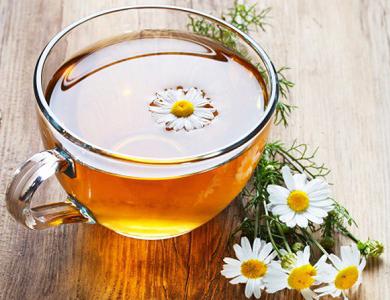
Genetic predisposition
Modern medicine is actively studying the issue of genetic predisposition to overeating. Research shows that children of overweight parents usually prefer fatty foods, do not like vegetables, and are more likely to overeat. Many facts are cited as evidence of the involvement of genetics, and not upbringing. In particular, studies of twins show that identical twins, raised in the same family, in the same environment, have more similarities in gastronomic preferences than fraternal twins, also raised in the same family, attending the same educational institution.
Between 2002 and 2003, scientists discovered six new genes that are associated with obesity. According to British doctors, carriers of all six genes, on average, weigh five pounds, that is, about 2 kg, more than normal. That is, genes do not necessarily have to lead to obesity. However, the connection with these genes and obesity is still pronounced, that is, the likelihood of obesity in the presence of these genotypes increases significantly compared to if these genes were not present. Science estimates the number of people with a combination of six genes at 40-70% of the entire world population who are overweight.
Not all of these six genes actually affect metabolism. At least three genes can be identified that cause obesity as a result of the tendency to overeat caused by these genes. These are the genes GAD2, Taq1A1, FTO[4].
Effect of the GAD2 gene
In 2003, a gene known as GAD2 was discovered to play a role in stimulating appetite. It accelerates the brain's production of GABA (gamma-aminobutyric acid), which reacts chemically with neuropeptide Y to stimulate appetite. In people with the more active of the two forms of the GAD2 gene, GABA is released in larger quantities, and accordingly, they are more prone to overeating. At the same time, the second form, on the contrary, protects against obesity[4].
Effect of the Taq1A1 gene
It has also been found that low levels of dopamine, a hormone that causes feelings of pleasure and satiety, are inherited. With a low level of this hormone, slow decision-making, disturbances in motor activity and the cardiovascular system are observed, and these deviations are complemented by overeating. Also, overeating may be associated with a small number of dopamine D2 receptors, which is caused by the Taq1A1 allele, while this genetic disorder, according to scientists, affects half of the population of developed countries. Drug addiction is also associated with these receptors. Brain research shows that overweight young women experience a smaller pleasure response in the brain after drinking a cup of chocolate milkshake than those who are not overweight. This reaction is precisely due to dopamine. A year later, the same study participants who showed a reduced brain response to food also showed significantly more weight gained.
The Americans tested their theory on people. To earn a reward in the form of food, each subject had to click the mouse button on the computer 20 times, get more food - 40 times, or choose to relax and read a newspaper instead of food. People with the Taq1A1 gene pressed the button much more actively than others. Combined with the motivation to obtain food, genotype drives people to eat more and more. But at the same time, high motivation for food itself is not necessarily associated with this genotype, although carriers of the genotype during the experiment still ate more than people with high motivation for food, but without the Taq1A1 gene. Thus, dopamine may be a target for drug therapy for weight loss[4].
Effect of the FTO gene
Also, the tendency to overeat is associated with a gene called FTO. Previous studies have shown an association of this gene with increased body weight. However, later studies showed that in children this gene is no less associated with overeating: children at risk, being well-fed, did not refuse a plate of cookies. However, a genetic connection between the FTO gene and children’s interest in physical exercise has not been found, so we can assume that a genetic tendency to overeat does not mean a lifelong sentence [4].
Feedback to genes
Overeating also has a feedback relationship with genes: even without being genetically determined, it can disrupt the genetic structure of a person, adding to the picture of the heredity of descendants, in addition to obesity, also diabetes and cardiovascular pathologies. In this case, we are talking about changes in groups of genes, and not in individual genes. The number of these genes is estimated to be in the hundreds, and these genes in the experimental mice were altered by the high-fat diet. The results of studies on mice were confirmed by analyzing the medical records of patients prone to overeating. In turn, a predisposition to overeating is also caused by the presence of diabetics in the pedigree. Overweight patients with ancestors who had type 2 diabetes gain weight much faster than people without this genotype.
It has been established that overeating and obesity affect the genes responsible for macrophages. In a normal state, the production of macrophages protects the body from infections and other negative factors for it. In the case of genetic disorders caused by overeating, their production is weakened. There is also a genetic predisposition to the so-called metabolic syndrome, which includes high blood sugar, high blood pressure and clogged arteries[4].
Folk remedies for the treatment of panic attacks
Now it’s clear what panic attacks are and how to fight them. What can folk remedies offer to help combat this disease? Since it is impossible to lie down or sit during a panic, and all attempts to distract yourself are futile, you can resort to the following methods:
- Light physical activity.
- Keep your feet in a basin of hot water or pour cold and hot water on them up to your knees.
- Breathing exercises (the technique of inhaling and exhaling into a paper bag helps).
- Write down everything you feel, this will be very helpful in understanding your fear and accepting it.
- Drink a decoction of mint, chamomile or green tea.
- You can try making an infusion from the following herbs: take 4 parts lemon balm, 3 parts rue and 3 parts thyme and mix thoroughly. 1 tbsp. l. Pour the collection into a glass and fill with cold water. Let it brew for several hours, then drink throughout the day.
Treatment of panic. TCM Grounding Exercise
A person suffering from panic attacks spends most of their time in the mental space, and tension accumulates in the head area. The face of such a person rarely relaxes due to worries about the future and grief mixed with regrets about the past. Among other things, the eyes are constantly tense.
During panic attacks and in a state of constant anxiety, heavy thoughts in a person, according to TCM, the Spleen Meridian is affected. And it is directly connected with the element of Earth. Therefore, the TCM grounding exercise helps to release tension from the head and discharge through the legs into the ground.
Grounding Exercise
You should take off your shoes and first just feel your foot.
Then, as you inhale, we begin to bend all your toes at the same time, trying to tense them as much as possible, and as you exhale, slowly and smoothly begin to release the tension, but when you reach final relaxation, do not stop, but tense your toes again, but trying to spread them out as far as possible .
After this, while inhaling, collect your fingers, pressing them to the foot, and while exhaling, slow, smooth, even, deep and thin, relax your fingers again.
It is better to fold your hands under the navel (palm on palm) during the exercise. This exercise can be done standing or sitting. While doing this, keep your spine straight.
The exercise cycle, consisting of two parts, is repeated six times in the morning and the same number in the evening. Grounding strengthens the Spleen, which transfers energy to the Kidney Meridian and reduces fear.

How to deal with a panic attack when you don't have enough air
Consider the question: “Panic attacks, how to fight when there is not enough air?” Often during an attack there is a feeling of suffocation: it is impossible to take a full breath (as if you want to yawn) - hyperventilation syndrome with VSD. There is a fear of suffocation.
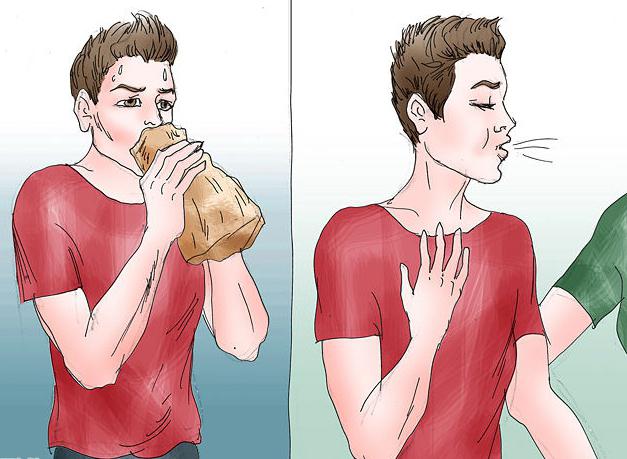
In this case, you need to do the following:
- constantly remind yourself that it is impossible to suffocate - air is supplied in the required quantity;
- breathe into a paper bag (plastic bottle, scarf);
- drink mint tea;
- rub the nasal sinuses with the usual “Star” - this will soothe and make breathing much easier.
Is it possible to get rid of panic attacks forever?
You can beat panic attacks forever. How to fight on your own is what you need to understand to achieve this goal. There is no need to be upset if it doesn’t work out, this is not a matter of one day. Every victory, no matter how small, will make a significant contribution to the fight against the PA.
It is necessary to learn self-control, understand that people do not die from PA, and believe in it. And to make sure, you need to carefully understand the problem with the help of literature, talk with people who also suffer from panic attacks.

